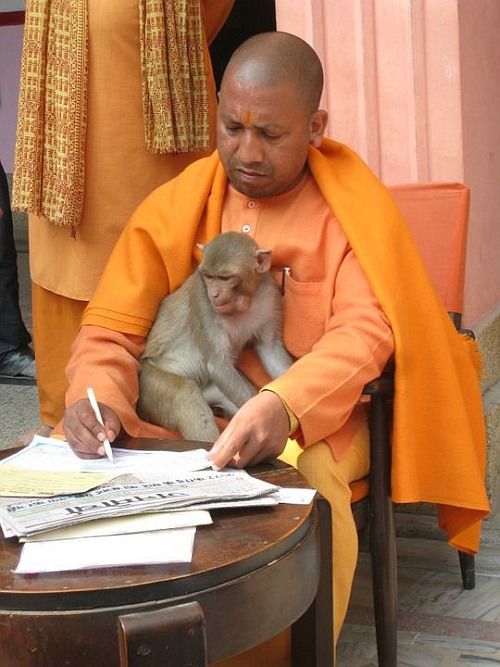 'The country has moved beyond the likes of Yogi Adityanath and his medieval thinking. The results of the by-elections are early warning signals by impatient Indians. It's up to the BJP to learn its lesson or face the consequences,' says Ashutosh.
'The country has moved beyond the likes of Yogi Adityanath and his medieval thinking. The results of the by-elections are early warning signals by impatient Indians. It's up to the BJP to learn its lesson or face the consequences,' says Ashutosh.
History has a knack of repeating itself, especially if one does not learn from it.
This is more apt for the BJP today than ever. The BJP received a major setback in the by-elections, retaining only 10 of the 23 seats it held earlier in Uttar Pradesh, Rajasthan and Gujarat.
These are states where the party had swept in the parliamentary election. The loss of 13 seats will pain the BJP for days to come.
I don't remember any other party facing such an ignominious defeat in such a short time after winning a massive mandate at the national level. The Narendra Modi government has just completed 100 days in government and technically the honeymoon is still not over.
How can one describe the BJP's defeat? Are these early warning signals for the government and the party or is the love marriage between Modi and the people on the brink of divorce?
In my opinion, it is too early to rubbish the BJP to oblivion. But yes, these results do tell a story, especially the losses in UP which, earlier this year, demonstrated unprecedented support for the BJP.
The BJP with its poll partner, the Apna Dal, had won 73 Lok Sabha seats. But in the by-elections the party lost 8 out of 11 assembly seats. If the BJP is willing to introspect, then it has to put extra effort and dig out a few facts from the past.
In 1993, four BJP-ruled states were dismissed after the Babri Masjid demolition. P V Narasimha Rao, then the prime minister, took the decision because the Babri Masjid had been demolished despite the BJP's promise to the Supreme Court to protect the 'structure'.
The BJP was then very hopeful that it would return to power with a thumping majority in the four states. To its dismay, it lost all the states except Rajasthan. Even in Rajasthan it did not get enough numbers and formed the government only with the support of Independent legislators.
For the BJP the biggest shock was UP, because the state was at the centre of the Ram Mandir movement and the party was led by Kalyan Singh, considered then at par with Lal Kishenchand Advani and Atal Bihari Vajpayee, and a Hindu icon.
The BJP was unable to get a majority. Its seats fell from 211 to 177. Mulayam Singh Yadav became UP chief minister. In Madhya Pradesh, where it was organisationally very strong, the BJP suffered a humiliating defeat and won just 117 seats -- before the election it had 219 seats and ran the government.
In Himachal Pradesh the BJP won only 8 seats. Earlier, it had 48 seats in the 68-member House. Why did the people reject the BJP which seemed to be on the ascendance? The polarisation of society on religious lines was complete and the BJP had just tasted blood in the form of the Babri Masjid demolition; above all, the mood of the party cadres was upbeat. So, what went wrong?
Christophe Jaffrelot, a leading expert on the BJP, writes in his book, The Hindu Nationalist Movement in India, 'the strategy of ethno-religious mobilisation enabled sadhus and young Hindus, notably from the Bajrang Dal, to assert themselves as political actors beyond the controls of the RSS and BJP. Their violent methods damaged the credibility of the BJP.'
The BJP after 21 years, in 2014, committed the same mistake. It unleashed those forces which had damaged the party's prospect in the assembly election in 1993, just after the Babri Masjid demolition.
This time, the BJP's assessment was wrong when it gave credit to communal polarisation for its Lok Sabha victory in UP. The truth was that people were fed up with Congress misrule and were looking for change.
Modi and the BJP emerged as an alternative and the people of India reposed faith in them. I don't discount the communal polarisation but to believe that it was the sole reason for the BJP victory was a mistake.
The BJP under Amit Shah's leadership committed exactly the same mistake. The communal Yogi Adityanath was given charge of leading the party's campaign in UP.
Adityanath has limited appeal in Gorakhpur and its adjoining areas, and he could not be the BJP's face in a politically surcharged state like UP. His poisonous and violent statements against the Muslim community greatly upset UP's middle class in the same way that it did in 1993.
I am reminded of L K Advani's statement in 1993. 'No party can have credibility if it is seen as a one issue party,' Advani had said then. 'We would like the BJP to be accepted by the people as a party which has a holistic view of the problems of the country and which is not trying to win power simply on the basis of an emotional issue.'
During the 2014 parliamentary campaign Modi was projected not in the narrow sense but as a leader who had solutions to India's problems. He was projected as a leader who had the vision to take India to the next level of development.
Not once did I hear Modi raising communal issues during the 2014 election campaign. But the reverse was true during the by-elections. Yogi Adityanath unleashed only one issue -- 'love jihad.' He and the BJP seemed oblivious about the major issues faced by the people of UP. There was no talk of price rise, corruption, unemployment, lawlessness, women's security, poverty, the economic mess and industrial decline.
The BJP, forgetting what Advani had said, tried to win the by-elections simply on the basis of an emotional issue. And the results are for everyone to see.
If it has to nationally replace the Congress as a party of governance, then the BJP has to change its mindset and tunnel vision. The party should not forget that the people have voted for Modi for the promises he has made of a modern India, for the hopes he has generated of inclusive growth and for the solutions he has offered to young minds.
The people of India have not voted for him to dig out the past and settle scores. The country has moved beyond the likes of Yogi Adityanath and his medieval thinking.
The results of the by-elections are early warning signals by impatient Indians. It's up to the BJP to learn its lesson or face the consequences.
Ashutosh, a member of the Aam Aadmi party, is a former journalist.
Image: Yogi Adityanath, the MP from Gorakhpur.










